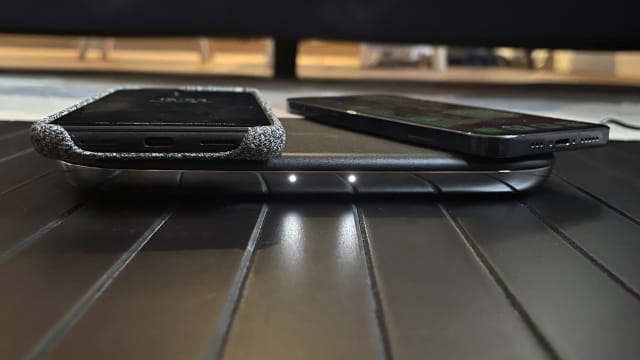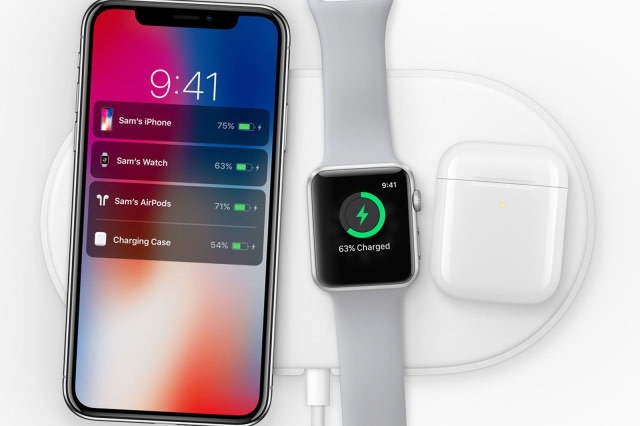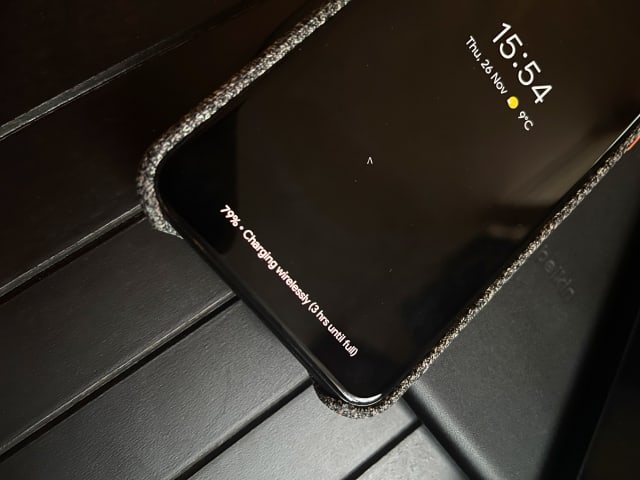
Mat Smith / Engadget
The TrueFreedom Pro is understated and stylish (if a phone charger can be stylish), with a black matte surface and chrome trim. Nothing interrupts this surface, barring the port for powering it, although it’d be nice to have a USB-A or USB-C port to charge non-Qi compatible devices. A lot, if not most, of the bigger wireless chargers have them, and at $130, it feels like Belkin cheaped out here.
Most of Belkin’s rivals don’t have overlapping charging coils, however, and the best thing is how incredibly forgiving placement is on this thing. Not only does it work if your phone is slightly off-center, but it can also be charged on the far edges, so long as enough of the wireless charging components can interact.
Alongside the familiar vibration or LED light-up when your gadgets start wirelessly charging, the mat has two LEDs along the edge to indicate when devices are being powered up. I wish they’d gone for something to light up along the upper edge of the charger. If you decide to position the mat lower, say on an armrest or a low shelf, then it’s easy to miss the indicator light.
And you might want to pay attention. I tested several phones and devices that charge wirelessly, including two sets of AirPods, an iPhone 11 Pro Max, Pixel 5, iPhone 12 Mini and some older phones from OnePlus and Huawei, and the mat could handle charging combinations of any of the above. With an iPhone 12 Pro and 12 Pro Max, however, I got the first appearance of the amber light — meaning a device wasn’t correctly charging. With some cajoling, I did manage to get a sustained charge into the iPhone 12 Pro Max, but it defeated the purpose of this charger.
I checked in with Belkin, which said that ”testing for all iPhone 12 models is still being conducted.” It added that the TrueFreedom Pro was designed for the iPhone 8-11 “only” — these are the models noted on the box. I wonder if MagSafe is affecting those multiple coils — magnets and inductive charging use the same rules of physics.
What happened to Apple’s AirPower?

Apple
Apple’s AirPower wireless charger was meant to power multiple devices (your iPhone, your wireless charging AirPods and your Apple Watch) from a single surface, no connectors needed. AirPower would have had multiple overlapping coils to avoid the curse of wireless charging sweet spots, and the pitch involved intelligent power management between devices to prioritize what gets charged first — something Belkin’s charger doesn’t boast.
But AirPower never happened. Eighteen months after being announced at its September 2017 keynote, the company killed development of the charging mat, with Apple Senior VP of hardware Dan Riccio saying: “We’ve concluded AirPower will not achieve our high standards.”
He added: “We continue to believe that the future is wireless and are committed to push the wireless experience forward.” The result, presumably, was MagSafe, which came over a year later.
No, the TrueFreedom Pro can’t charge your Apple Watch or many phones, like the Pixel 4a or OnePlus Nord, which lack wireless charging to begin with. There are also, still, those typical caveats of wireless charging, namely that it’s inefficient and slow — although 10 watts of charging is better than early 5W wireless chargers. The accusation of inefficiency is especially true here — all those coils to charge just two devices?

Mat Smith / Engadget
The TrueFreedom Pro is a better wireless charger though. It accommodates more devices, meaning you could (slowly) charge a guest’s phone alongside your own, and there’s no need to align it or double-check that it’s charging like it should be — iPhone 12 Pro woes aside. I wished all wireless chargers were this accommodating.



